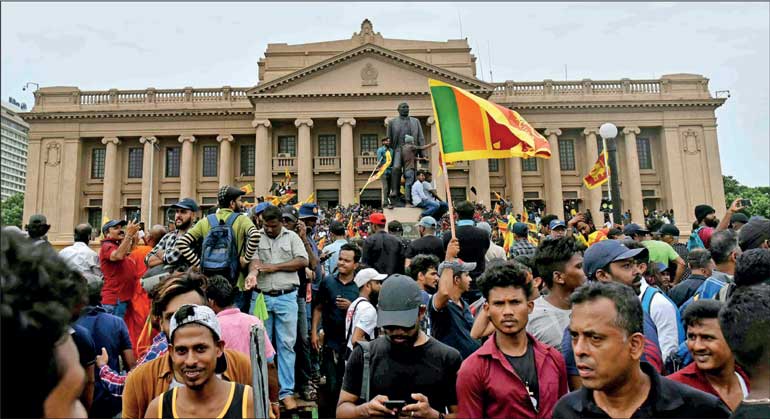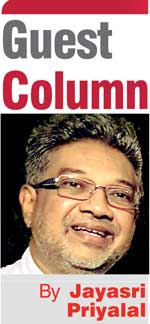Thursday Feb 19, 2026
Thursday Feb 19, 2026
Saturday, 8 June 2024 00:00 - - {{hitsCtrl.values.hits}}

People’s aspiration and hope for a change was short lived and short changed, widening the mistrust between policy makers and electorate further
One fact remains as an acceptable analogy; which is, those who cannot cope with change will never be able to initiate change in any circumstances. This applies to all stakeholders including those who caused and contributed to the current crisis. Fair share of responsibilities fall on to the electorate who got carried away with populism engineered by few; with an ultimate aim of state and regulatory capture for their advantage leaving the country into a dire state grappling with debt. Therefore, capacity and capability to initiate that essential change is absent in the DNA of politicians who deceived their constituents
 Many Sri Lankans would have joined in commemorating the 2,568 years of Buddha Parinirvana with much discourse about the fundamental truth, the core teaching of Buddhism about impermanence, last month. As we all realise the fact, that there is nothing permanent in this world; everything is subject to change. Change is the only permanent constant in the universe. This essay focuses on change from socio, political and economic angle.
Many Sri Lankans would have joined in commemorating the 2,568 years of Buddha Parinirvana with much discourse about the fundamental truth, the core teaching of Buddhism about impermanence, last month. As we all realise the fact, that there is nothing permanent in this world; everything is subject to change. Change is the only permanent constant in the universe. This essay focuses on change from socio, political and economic angle.
Sri Lanka is undergoing its worst economic crisis without any hope of getting it into a recovery track. There is a clarion call from the masses aspiring for a system change as a springboard towards chalking out a recovery path to overcome the crisis. Yet, no one knows or discusses what that system should be to put in place.
One fact remains as an acceptable analogy; which is, those who cannot cope with change will never be able to initiate change in any circumstances. This applies to all stakeholders including those who caused and contributed to the current crisis. Fair share of responsibilities fall on to the electorate who got carried away with populism engineered by few; with an ultimate aim of state and regulatory capture for their advantage leaving the country into a dire state grappling with debt. Therefore, capacity and capability to initiate that essential change is absent in the DNA of politicians who deceived their constituents.
This year 2024, is remarkable for those countries where representative democracy functions. Over two billion voters are expected to cast their votes at polls. As per predictions in 70% of the elections a change in government is anticipated. Some elections are already over and results are known. In Sri Lanka there are two main elections in the pipeline namely the Presidential and parliamentary polls. The UK gets ready for polls on 4 July 2024. Change is the campaign theme of the Labour Party led by Sir Keir Starmer. Chase or change dilemma will be an option for the electorate in the USA to test in upcoming presidential elections in November 2024.
Change and the chase countercyclical in Sri Lanka
In the last Presidential election in 2019 Sri Lankan electorate rallied with President Gotabaya Rajapaksa giving him an absolute mandate with 6.9 million votes, anticipating a change for the better. It was too late for Sri Lankans to realise that their bet was on the wrong horse. That change triggered the public to rally towards a chase. People’s power proved greater than those who come and hold political power.
The so called people’s movement ‘Aragalaya’ forced the Prime Minister to resign with the ipso facto resignation of the cabinet of ministers. Amongst many wrong doings President Gotabaya Rajapaksa nominated an unelected PM to lead the cabinet without dissolving the Parliament with the reluctance to test the pulse of the people to secure the right mandate to govern. Rest is history, and finally the people’s power chased out President Gotabaya Rajapaksa culminating the grand achievement of the GoHomeGota campaign. Thereafter, people’s aspiration and hope for a change was short lived and short changed, widening the mistrust between policy makers and electorate further.
Have we learnt from similar power struggles from the past?
Our present has direct links in many ways to the past. The island nation has been deceived by many egocentric figureheads – as they cannot be named as true patriotic leaders – misjudged the public sentiments and aspirations and surrendered the sovereignty of the country to colonial masters. Does history repeat itself? Have we forgotten the bitter lessons learnt from history, is what is discussed in the next few paragraphs.
This writer is enthusiastically influenced by the historical knowledge shared by Prof. Raj Somadeva via Neth FM radio and the YouTube program. Due credit should be given to the Professor for all his extensive historical studies and the efforts to share them with the rest of the Sri Lankans in and outside the country. Prof. Somadeva narrates the stories very well with an appeal to draw parallels to the contemporary political power struggles with a warning not to repeat the past mistakes.
Coronation of Sri Wickrama Rajasinghe last King of Kandyan Kingdom 1798
Having beaten the British Army battalion sent by the Governor Frederick North badly in 1803 the powerful Kandyan Kingdom fell to the British by 1815. Internal power struggles between the Kandyan elites to capture the throne from the Nayakkar clan paved the way for colonials to step in effortlessly to end the 2,300 years of historical royal lineage, to govern. Finally Ceylon became a colony of the British Empire under King Gorge III.
Maha Adikaram Pilimatalawwe engineered the coronation of Kannasamy Naidu a nephew of Sri Rajadhi Rajasinghe over the legitimate claimant to the throne Muttusamy. Pilimatalawwe was ambitious of becoming the Kandyan King, worked closely with the British and installed Kannasamy in the throne assuming he can control the King to meet his egoistic goals.
The change he anticipated never happened. Then he conspired to kill the King. Pilimatalawwe and the conspiring gang were beheaded by the King. Pilimatalawwe engineered the change and had to work on a chase and he got eliminated by the person whom he throned to power.
Power crazy Maha Adikaram installed a weaker character in the throne so that he could overthrow him with the help of the British. The whole strategy backfired ultimately sacrificing the nation on a platter to the British ending a royal lineage of over two millenniums. The miscalculations of those close to political power to serve their selfish needs have ruined many countries bringing in misery, hardship and colossal loss of lives and property to its citizens. The island nation has many such cases throughout its history.
Putting a wrong guy in a critical position – are we repeating the same mistake?
The theme to this essay – Change for better not for the worst. Throughout history we Sri Lankans have repeated the same mistake and disrupted the nation’s progress leaving the plight in the hands of outsiders. Although there aren’t any competing empires in the current context, there are clear indications that the local political expectations are gravitating towards the emerging geo econo political centres.
The current political leadership or the conventional thought processes are not spurred with an organic strategic growth trajectory with originality backed thought process. None of the political parties have identified the right causes that led to the current crisis.
Moreover, they are getting ready to deceive the electorate to secure the mandate to govern to continue to repeat the ill-fated policy tools without coming up with viable policy options to break the vicious debt trap. Adage goes on to remind that – right diagnosis is half of the solution. Instead, many are getting ready to prescribe the failed remedies with a strong dosage as prescribed by the defunct cold war institutions. It appears that the healer itself is the disease leaving the patient bewildered and leaving the disease into an uncontrolled debt pandemic. We Sri Lankans need to think locally and act globally and not the other way around. In the absence of original ideas and remedies, local politicians are happy to swallow the bitter medicines prescribed with wrong diagnoses.
Since independence the ideology of various political parties were developed based on systems and discourses practiced in other countries introducing a wellfarestic socio economic system. Now it has turned towards the aspirations of the emerging geo-econo centres. Sri Lankans need to forge a unique turnaround strategy to serve the best interest of its people, and not to become subjects of other countries. Therefore, the Sri Lankan electorate needs to collate its political mandate in the hands of a leadership who will change the destiny of the country for the better and not for the worst.
Prisoners’ dilemma
Colonial masters connived with the power crazy Kandyan elites and captured the last King of Ceylon, Sri Wickrama Rajasinghe, dethroned, imprisoned and deported to India. Once you fast track the historical events, we can extrapolate the current situation drawing many parallels. Unlike in the past, the leaders who mislead and mismanage the future of the nation without any original thinking and being subservient to foreign advice will never be deported. They will be practicing prisoners’ dilemmas remaining on the island, having given away ports, harbours, airports and other critical infrastructure to foreigners to manage and own.